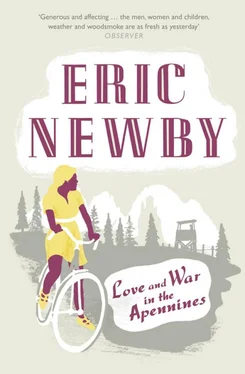In the centre of the village, which was called Fontanellato, out of sight of the prisoners in the camp, was the Rocca Sanvitale, a forbidding-looking fifteenth-century castle, isolated behind a water-filled moat. In the castle, until the war came, had lived the Conte Giovanni , the last of the Sanvitales, one of the most ancient and illustrious families in Italy, which, today, is extinct. The buildings which faced the castle had deep, shadowy arcades under which there were shops and cafés where farmers used to congregate on Saturday, which was market day; and in the street which led to the santuario and the orfanotrofio , there was a war memorial of the First World War, which for Italy had been much more bloody than the one she was at present engaged in, with a long list of dead on a plaque at the foot of it. This was more or less all we knew about Fontanellato. Apart from a senior officer who had been taken on a tour of the village for some reason, none of us had ever seen it. What I have written is the sum total of what he told us when he returned. It was rather like listening to a lecture by some medieval traveller and hearing him say, as he pointed to the map, ‘Here be dragons’.
Living in such a grandiose-looking building we felt that we could scarcely be regarded as objects of compassion by the local inhabitants. Although some officers when they arrived at it from other camps complained about the overcrowding, which was severe, and the lack of privacy, which was complete, to me and most of my friends who had been brought here from a much more primitive camp, it seemed a luxurious place and we were very surprised to find that we were to sleep in beds instead of the double-tiered bunks to which we were accustomed.
When we first arrived, at the beginning of March, there was no space for exercise outdoors, apart from a small, wired-in compound behind the building in which we assembled twice a day to be counted, or more frequently if the Italians suspected that someone had escaped; but the Italian commandant, an old, regular colonello , allowed parties of prisoners to go for route marches in the surrounding countryside once a week under a general parole, which covered the period when we were actually outside the gates. Parole or not, we were heavily guarded during these excursions which always followed routes along unfrequented lanes far from any village.
We looked forward to these outings which were sometimes cancelled at the eleventh hour for unexplained reasons, or because the senior officers refused to come to terms on some piddling point of military etiquette which most of the people in the camp, being temporary soldiers, and almost none of the Italians, because there were only about two regular soldiers among them, were ever able to comprehend. As in every other prison camp, the most lively differences of opinion between the senior British officer and the colonello and his staff arose over the interpretation of the various clauses of the Geneva Convention, which governed the treatment of prisoners.
We marched at a tremendous rate, glad of the exercise and taking sadistic pleasure in exhausting our guards who were mostly small men with short legs. We marched along flat, dusty roads; past wheat fields; fields in which forests of Indian corn were growing and into which I longed to take flight; along the foot of high green embankments which protected the land from the torrents which at certain seasons poured down from the Apennines into the River Po; past huge fields of tomato plants and sugar beet, groves of poplars, endless rows of vines and great rambling farmhouses with farmyards full of cows and pigs and ducks and geese, and red-roofed barns with open doors in which we could just see great, mouth-watering Parmesan cheeses ripening in the semi-darkness. Where we went we saw very few people. Perhaps they were told to keep out of the way when we went past.
Looking at this burgeoning countryside in the spring and summer of 1943 it was difficult for the most optimistic of us to believe that Italy was in danger of collapsing through lack of food, although it was obvious that the Italian army was very badly fed. One had only to look at the exiguous rations which the soldiers who guarded us drew from their cookhouse. And here, so far as I could make out, there were no organisations as there were in Britain to make their life more supportable. No volunteer ladies dishing out fish and chips to them, and great squelchy, jam sandwiches, and cups of orange-coloured tea, and, saying ‘Hello’ and asking where they came from, making them feel that they were doing something worthwhile which somebody cared about. They were like souls in limbo or a lot of untouchables in Hindu India, lost in the low-lying ground which no one ever visited, somewhere between the railway workshops and the cantonment.
By prison standards, the food in the orfanotrofio was good. The official rations were not abundant for non-manual workers, which is what we were, and without anything to augment them they had a lowering effect, especially in the previous camp where the British cooks had usually succeeded in making the worst of them – their version of pasta al sugo being particularly loathsome; to me it always smelt of dirty dish cloths.
But here, at Fontanellato, for the first time since I had been captured, there was a regular supply of Red Cross parcels and instead of the parcels being issued complete for us to make what we would of the contents, as had been done in other places, here all the cookable food was removed and prepared in the kitchens. This was much more civilised than keeping a lot of open tins under one’s bed, as some of us had previously done (the Italians never allowed us to have unopened tins in case we hoarded them for an escape) and risking death by eating the contents of a tin of disgusting meat loaf that had been open for two or three days or, even worse, spending ages on all fours blowing away at a stove made from old tin cans, stoked up with bits of cardboard or, in extremis , pieces of bed board from the bottom of our bunks, as many had done in the past.
Drink and supplementary food were bought on the black market, which was even more extensive and better organised than it was in Britain, and a special float of Red Cross cigarettes was kept for this purpose and for the general corruption of the Italian camp staff, by responsible members of the British administration, ex-bank managers mostly, to whom this sort of thing was second nature.
Officially, we were allowed one tot of vermouth and one of wine each day by our administration, which was all that could be allowed if, in theory, everyone took their ration; but you could always buy other people’s ration tickets with cigarettes or chocolate if you preferred drinking to smoking. Because of this there were some good parties and some rather awful ones too.
The very first lieutenant-colonel who was sent to us, previously we had scarcely anyone above the rank of captain, gave a memorable one.
‘Well, good night gentlemen,’ he said when most of the drink was finished. ‘Time for bed.’
He opened the door of a tall cupboard which stood against the wall and walked into it shutting the door behind him, presumably under the impression that he was entering his own room. By the time it had been forced open, which was difficult because his rather ample trousers had caught in it, he was fast asleep. He was a nice, high-spirited old man, much too old in years to have been captured fighting in the Western Desert.
The wines were strange, dark and repulsive with various chemical additives, what the Italians call vini lavorati , worked on, primitive harbingers of the more sophisticated, doctored wines which rarely contain any grapes at all and which have made the Italian wine industry the byword that it is today; but like meths drinkers we enjoyed them better than no alcohol at all.
Читать дальше












